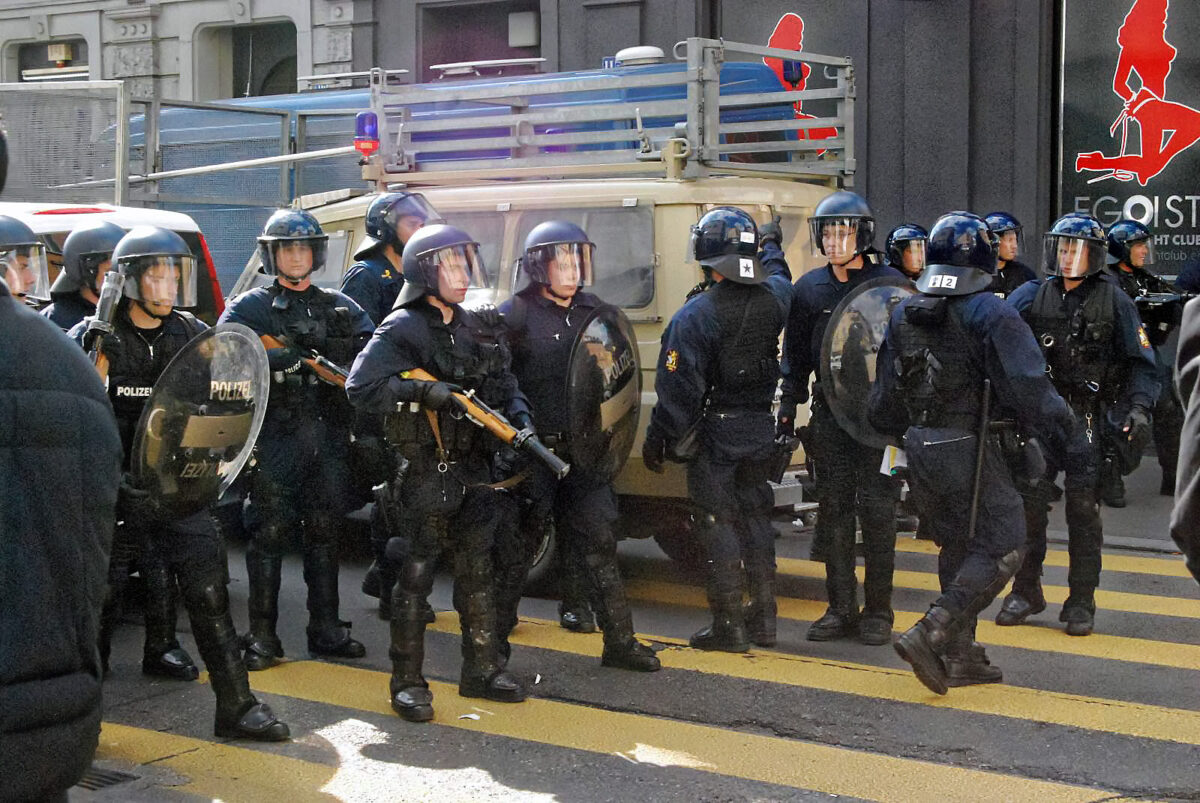When Prosecutors Confuse Acquittal with Conviction
The creativity of Swiss lawyers isn’t just evident in their banking laws or attorney statutes, which have paved the way for international money laundering and tax fraud, and more, for decades. A recent farce from the Zurich Directorate of Justice shows how inventive they can be with Newspeak.
According to internal communications from the Zurich-Sihl Prosecutor’s Office, a “judgment has been rendered against A.B.” (name known to the editorial staff). Against?
In fact, in 2023, prosecutor Daniela Senn (MLaw) claimed in a legal notice that A.B. had attached a “ruling issued against” A.B. as evidence in a complaint. The curious thing about Senn’s wording is that the ruling A.B. had submitted with the complaint had fully acquitted A.B. of all charges. And not under the principle of in dubio pro reo (benefit of the doubt). The court had unequivocally accepted the justifications for the actions attributed to A.B. The Limattal/Albis public prosecutor’s office, which had brought charges against A.B., had chosen not to appeal the decision, nor did the private plaintiff pursue an appeal.
As of 2023, that case against A.B. dates back over ten years: the acquittal in favor of A.B. has been legally binding for more than ten years. The ruling became relevant again in 2023 when A.B. learned that someone had falsely claimed that A.B. had been convicted at that time.

Prosecutor Daniela Senn, who received A.B.’s subsequent complaint for defamation (slander) against the author of this false statement, responded with a decision not to pursue the case, which A.B. found completely incomprehensible. Senn primarily justified this decision by arguing that the defamation was time-barred: the document containing the obviously deliberate false claim that A.B. had been convicted in 2010 had apparently been written in 2017 (under Swiss law, defamation offenses expire four years after the date they are committed, in this case, 2021). According to Swiss law, the defamation would be considered time-barred, regardless of the fact that A.B. had only learned of this allegedly 2017-written defamatory document in 2023, after it had been proven to have been circulated in 2022.
Prosecutor Confuses Acquittal with Conviction
What A.B. understood even less: in her notice, the prosecutor misleadingly claimed that A.B. had submitted a “ruling issued against” A.B. as evidence. What Senn presumably meant was the acquittal in favor of A.B., although her wording implied a conviction. A.B. had submitted the ruling precisely because the proceedings had ended in A.B.’s favor, to demonstrate the falsehood of the 2017 written claim that A.B. had been convicted, thereby proving the defamation.
A.B. filed an appeal against the prosecutor’s decision not to open a criminal investigation for defamation, arguing that the offense had only been completed in 2022, when the defamatory document was circulated, and that the statute of limitations should begin from the day of its circulation in 2022. However, under Swiss law, defamation is considered a “state offense, not a continuing offense,” as the Zurich Higher Court informed A.B., thereby confirming the statute of limitations had expired in 2021.
Orwellian NEWSPEAK of the Zurich Justice Directorate
Regarding the misleading claim that A.B. had submitted a ruling issued “against” them, A.B. filed a separate supervisory complaint with the Office of the Attorney General. A.B. demanded an explanation as to why prosecutor Daniela Senn had made this mistake on the very point that was central to the defamation case. In her decision not to pursue the case, the prosecutor confused a conviction with an acquittal in a ruling that was meant to prove the falsehood of the claim that A.B. had been convicted. Was this carelessness? Intentional? Provocation?

Whether it was carelessness or intentional, the Zurich Office of the Attorney General could not say. It passed the responsibility for commenting on the matter to Daniela Senn’s superior, Chief Prosecutor Daniel Kloiber (lic. iur.). He took the easy way out: in his response to A.B.’s complaint, he offered the flimsy argument that the phrase “a ruling issued against” someone does not specify whether the ruling was an acquittal or a conviction. By definition, Kloiber’s statement amounts to Orwellian NEWSPEAK.
ChatGPT from OpenAI Clarifies – Zurich Authority Evades
A.B. analyzed the issue with the help of OpenAI’s GPT-4 language model. The conversation is publicly accessible (click link). The language model assessed Daniel Kloiber’s interpretation as “unusual”: stating that a “ruling issued against” a person does not imply a conviction was “misleading” and “problematic,” particularly in the legal context.
A.B. confronted the “Department of the Interior and Justice of the Canton of Zurich,” which supervises the Zurich prosecutors, with these findings. The response from Tassio Suter (MLaw), a representative of the Justice Department, was dismissive: “From our point of view, there is nothing more to add to the statement by Daniel Kloiber”. The assessment of Kloiber’s response by ChatGPT-4 as “unusual,” “misleading,” and “problematic,” or the confusion of an acquittal with a conviction, was entirely ignored. The representative of the Zurich Department of Justice sidestepped these questions with his curt reply.
Office of Special Investigations Responds
At least the Office of Special Investigations finally acknowledged in a written statement that prosecutor Daniela Senn’s wording was “unfortunate.” However, the Office of Special Investigations rejected the allegation of abuse of office that A.B. had filed against Daniela Senn, stating that the records clearly showed the ruling submitted by A.B. as evidence did indeed contain an acquittal in favor of A.B., as A.B. had claimed.
These records mean that Daniela Senn, at least, did not forge the written judgment to cover up her minor data falsification in the decision not to proceed with the case. That decision falsely claimed that a judgment had been issued ‘against’ A.B. As a result of Daniela Senn’s falsification, it creates the absurd implication that A.B. must be irrational or even insane as the falsification suggests that A.B. submitted a judgment against themselves as evidence to prove that the statement about their conviction was false and defamatory. This portrayal not only undermines A.B.’s credibility but paints a picture of someone acting irrationally, further damaging A.B.’s reputation by implying mental instability. This manipulation of the facts not only discredits A.B. but also amounts to a form of institutional bullying. By presenting A.B. as irrational or mentally unstable, Senn’s falsification distorts reality in a way that humiliates and undermines A.B., further amplifying the personal and reputational harm. However, following the clarification by the Office of Special Investigations, A.B. withdrew the penal complaint against Daniela Senn that had been filed in parallel with the supervisory complaint.
Comment:
If supervisory complaints to the Public Prosecutor’s Office and the Department of Justice of the Canton of Zurich, as in the present case, are deflected, it is a sign that democratic control of the authorities is not working. At least the Office of Special Investigations proved to be reliable.
What remains is a discussion about the quality or negligence within Zurich’s prosecution offices. Also remaining is a debate about the arrogance of certain officials and prosecutors (Daniela Senn, Daniel Kloiber, Tassimo Suter). And let’s talk about institutional bullying, and bullies, too. Lastly, a debate remains on whether there is room for NEWSPEAK of the Justice Directorate in a democracy. In our opinion: absolutely NOT.
Update November 12, 2023:
A.B. contacted the Ombudsman's Office of the Canton of Zurich by email on October 11, 2023. A.B. sent them the link to this article and asked about the experience with the Justice Department as described above: "How does the Ombudsman's Office of the Canton of Zurich view the procedure in the Canton of Zurich against errant public prosecutors when supervisory complaints apparently are no longer taken seriously and addressed?" On November 12, 2023, A. B. informed the Zurich Observer that they had not received a response from the Ombudsman's Office. The office is chaired by Mr Jurg Trachsel, a lawyer and member of the right-wing populist "Swiss People's Party" ("Schweizerische Volkspartei", SVP).
Update November 29, 2024:
Prosecutor Daniela Senn transitioned in 2024 from the Zurich-Sihl Public Prosecutor's Office to the Public Prosecutor's Office II, Department for Organized Crime. Her bullying skills are certainly more purposefully employed there than in a general prosecutor's office.
It should be considered that this reassignment might also be a strategic move by the Chief Public Prosecutor's Office for their own benefit: anyone who publicly criticizes Prosecutor Daniela Senn since her transfer would inevitably be drawn into the sphere of her new responsibilities regarding organized crime. This presents a somewhat disadvantageous background, naturally raising the threshold for publicly criticizing Daniela Senn (is the Chief Public Prosecutor’s Office perhaps anticipating further public complaints regarding Daniela Senn?). It is worth noting, that the Newspeak affair occurred in 2023, while Daniela Senn was still working for the general Zurich-Sihl Prosecutor's Office.
Political Responsibility for the Zurich Prosecutor’s NEWSPEAK Affair:

Since 2015, Ms Jacqueline Fehr of the Social Democratic Party is in charge of the Zurich Justice Directorate (image source: Canton of Zurich).
Translated by ChatGPT-4





